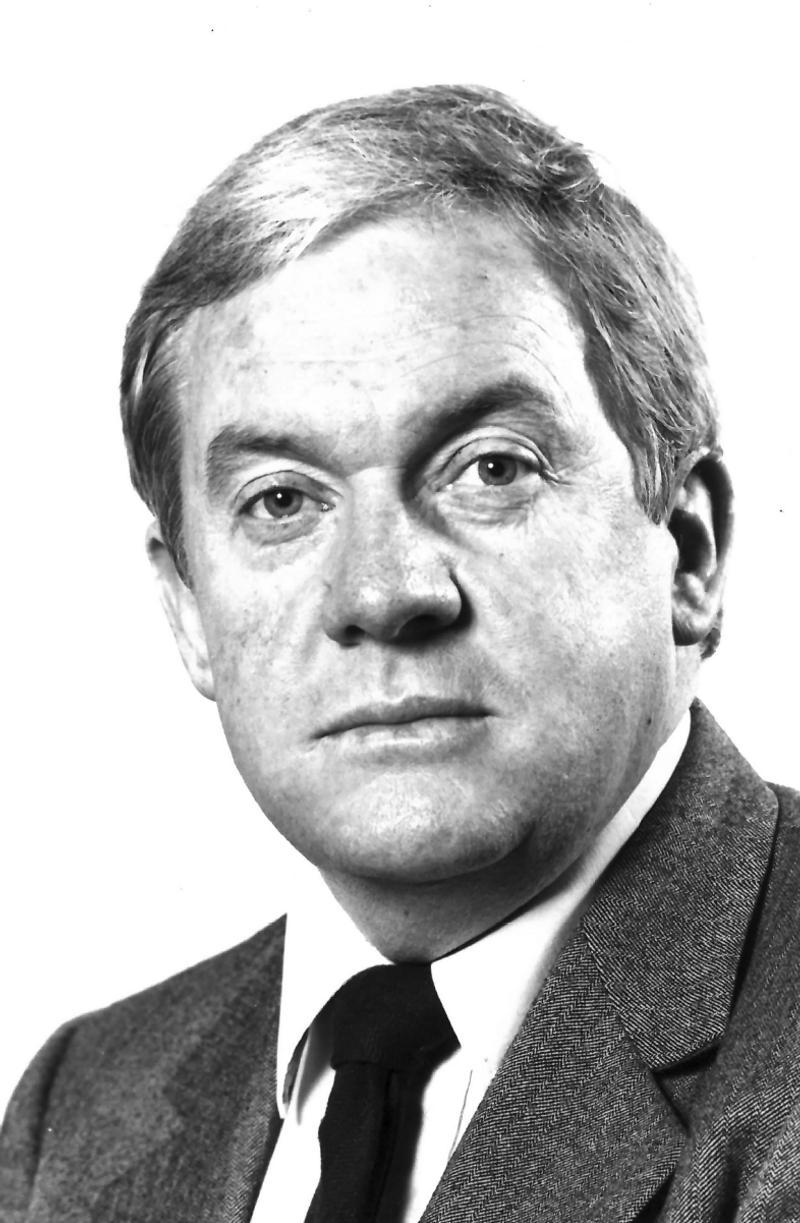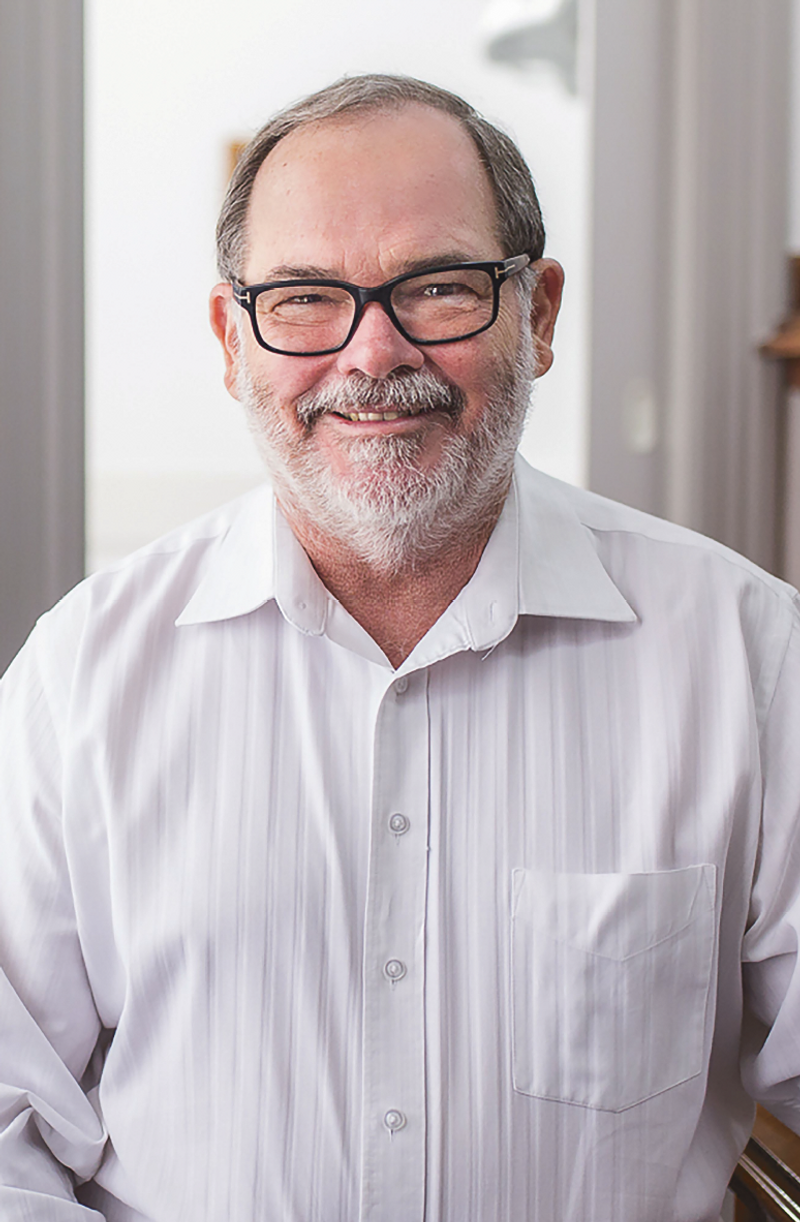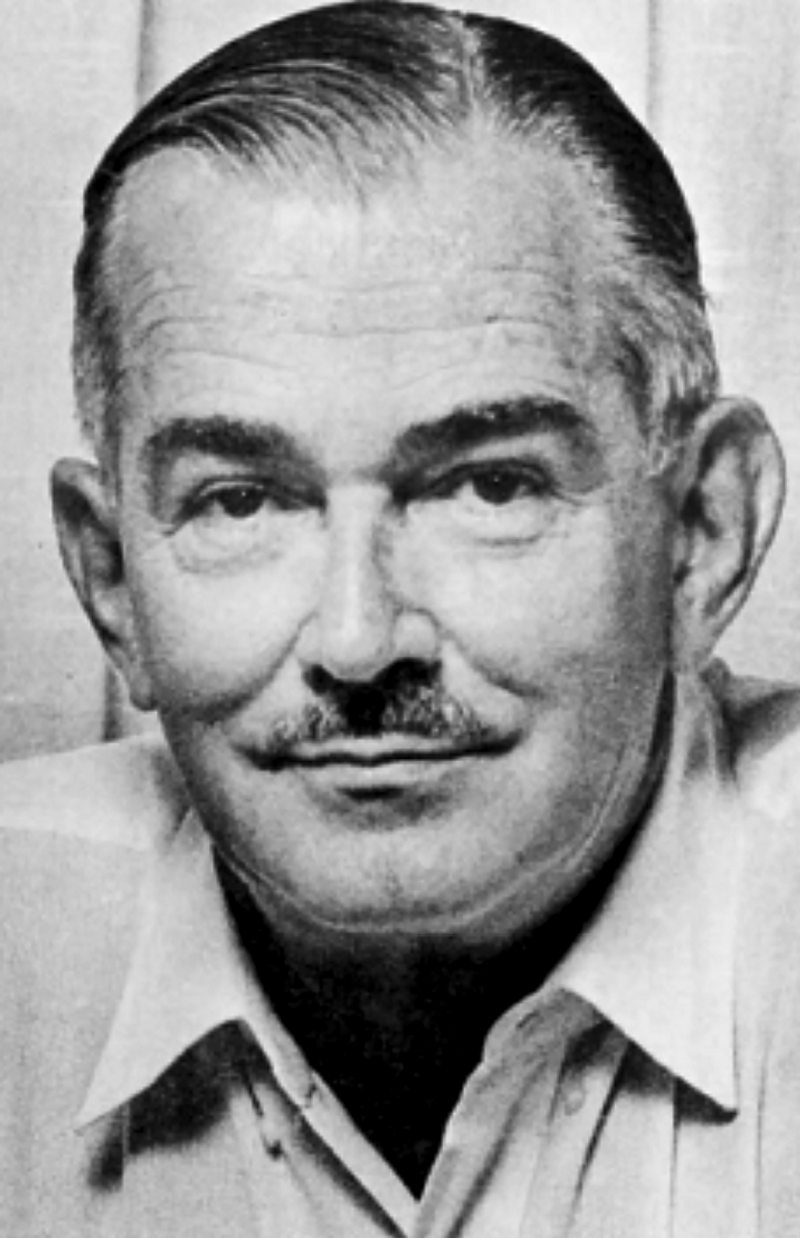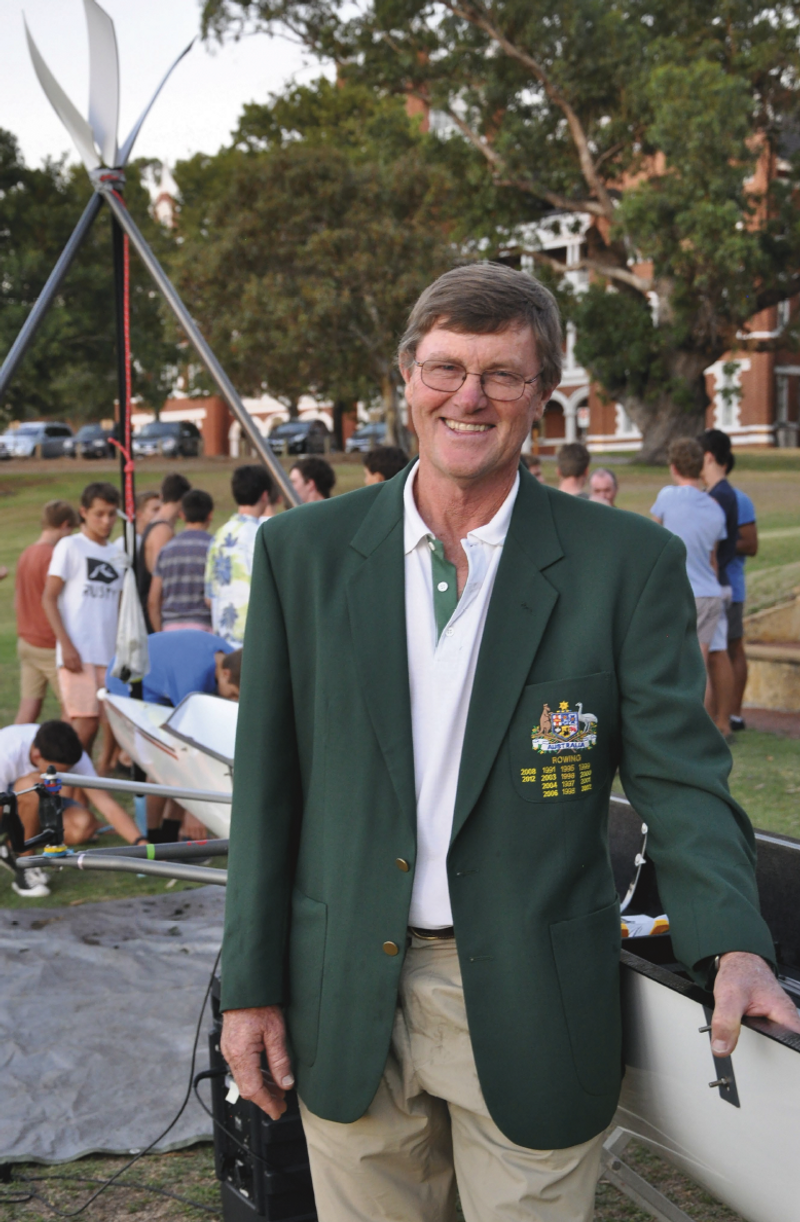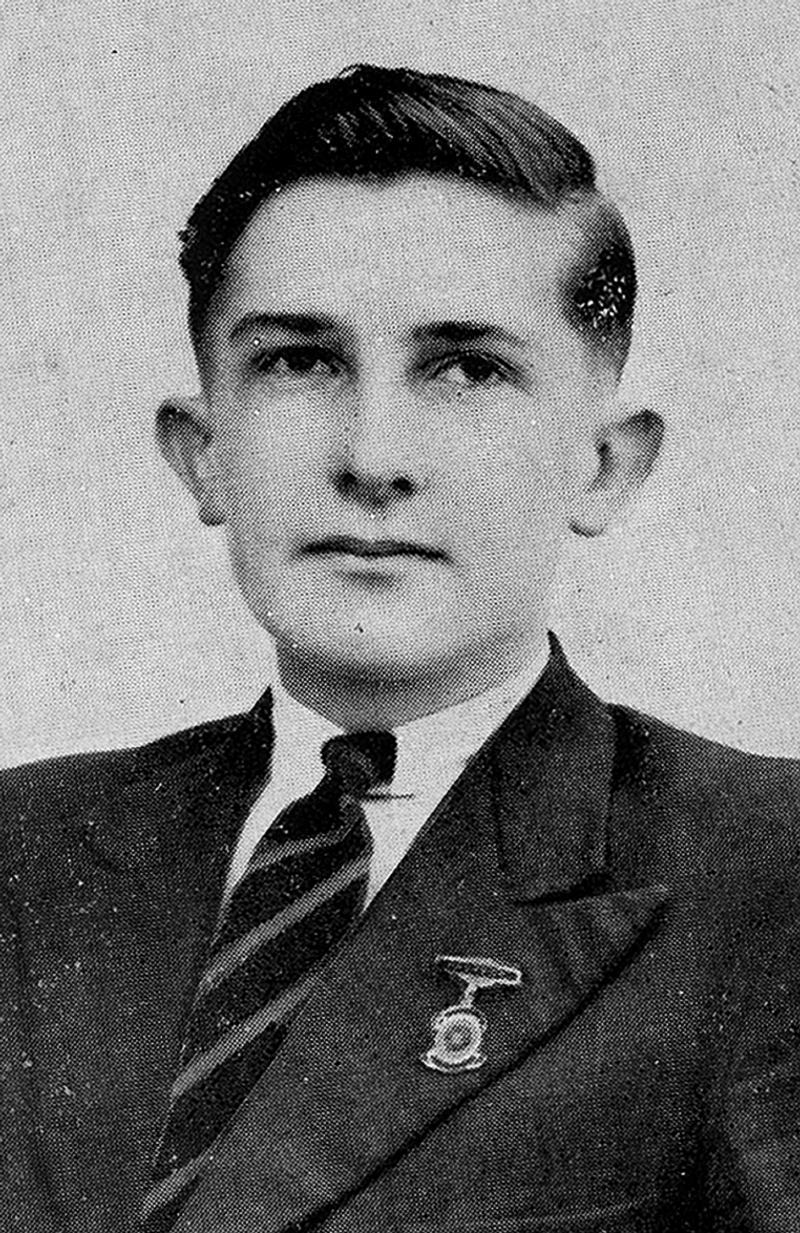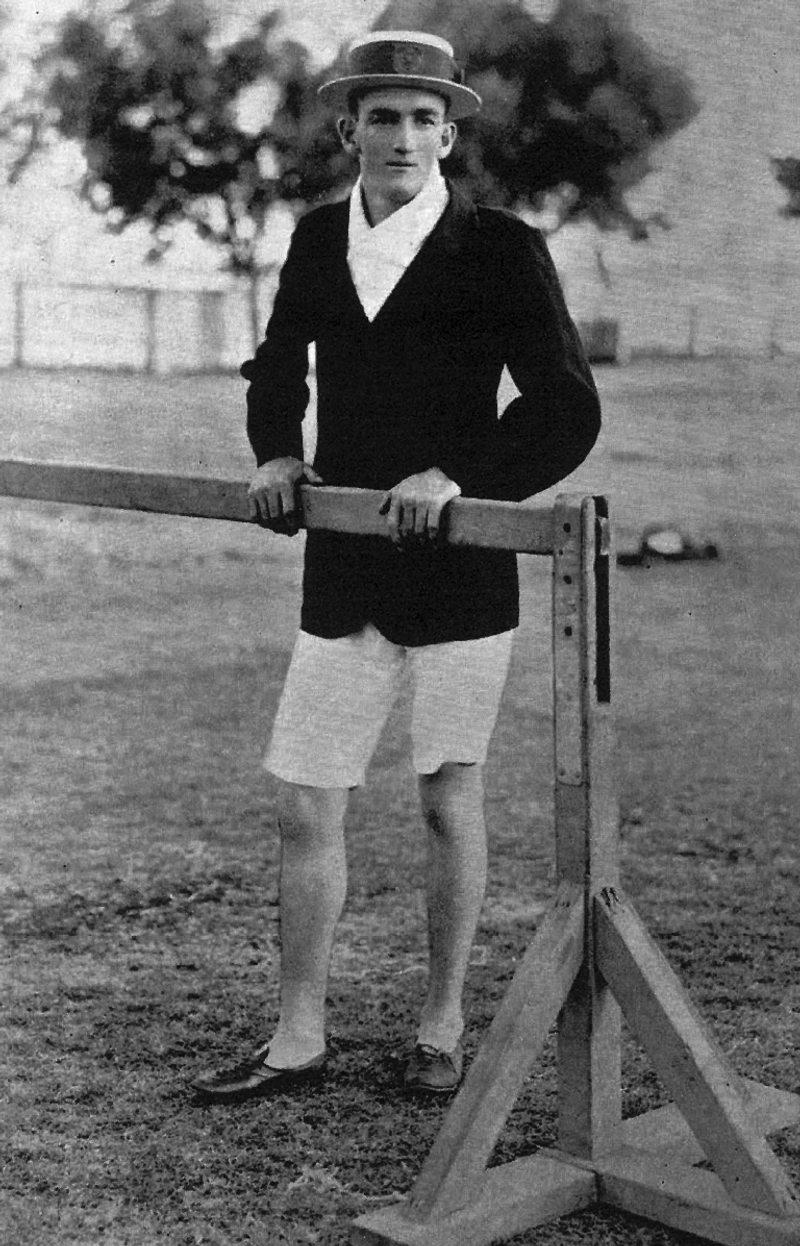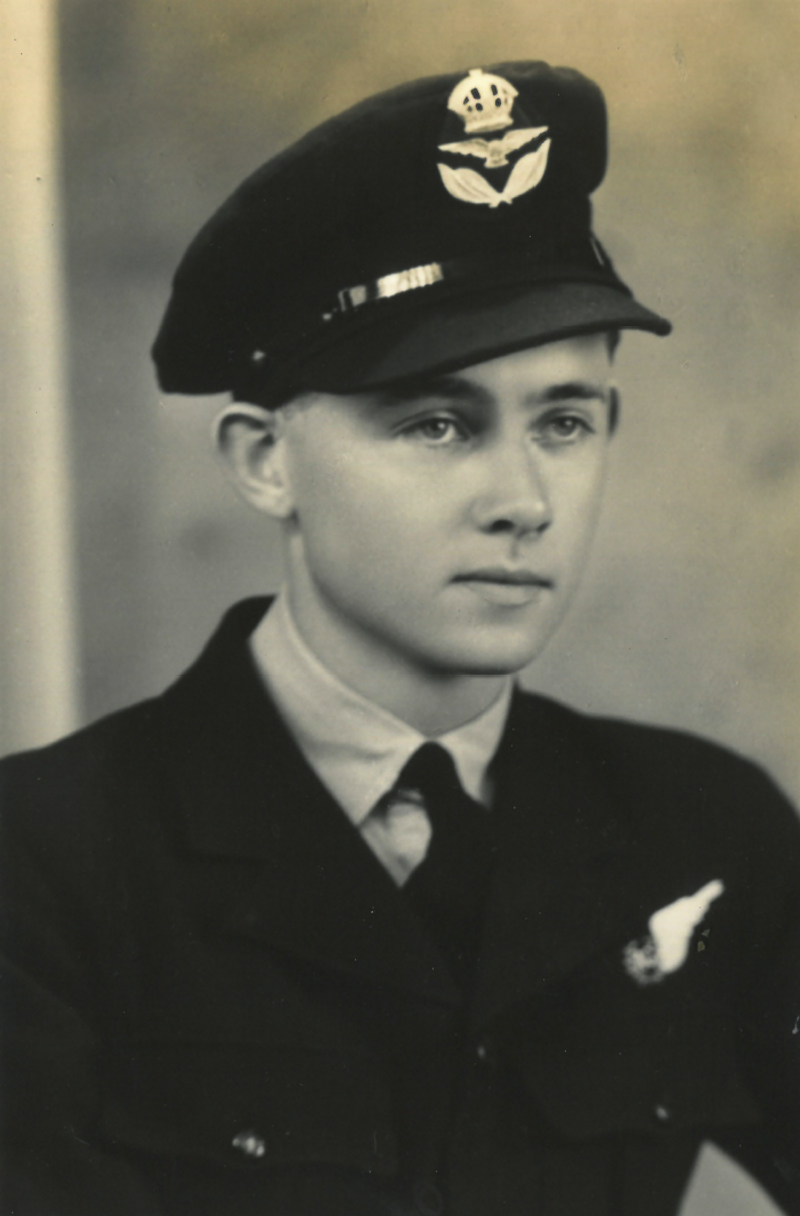Contact
Dr Geoff Gibbs AM
Class of 1957
Geoffrey Gibbs is one of the fathers of Performing Arts in Western Australia. He grew up in Kalgoorlie where his father was a miner. Geoff was a phenomenally talented actor of stage and screen, director, producer, teacher and director of one of Australia’s greatest performing arts schools.
His own acting talent first showed on the Aquinas stage in his portrayal of Goneril, one of the three daughters in King Lear. In 1957, his leaving year, Geoff received a Distinction for “Art of Speech”. As a boarder, Geoff loved the combination of sport and arts that Aquinas College offered and thrived whilst at the school. On leaving the school, he went to Graylands Teachers’ College and completed his teaching degree. He moved to Merredin to teach. This is where he met his wife, Carole. They eventually moved back to Perth with their young family, Paige, Ashleigh and Nathan so Geoff could study at the Western Australian Institute of Technology.
During this time, Geoff held down three jobs, whilst performing five nights a week and rehearsing for the next show he was directing. He was always a force of nature. He eventually moved to Claremont Teachers College where he headed up the Drama department. Geoff was keen to continue his studies, so he and the family relocated to Columbus Ohio where Geoff completed his PhD in Drama in Education at Ohio State University. It was here that he played his favourite role - King Lear.
Returning to Perth in 1980, Geoff helped establish the Western Australian Academy of Performing Arts (WAAPA). As founding Dean of Acting, Geoff taught some of the country’s most talented actors: including Hugh Jackman, Frances O’Connor, Dominic Purcell, Lisa McCune, Marcus Graham and William McInnes. In 2002, Geoff was awarded the Member of the Order of Australia for his services to the performing arts through the establishment, development and promotion of WAAPA.
On his death in 2006, WAAPA renamed the main theatre in his name. Hugh Jackman made a special trip to Australia to honour his teacher for the occasion. His colleagues at Ohio State planted a tree and erected a plaque in loving memory of him. Geoff was a wonderful example of what gifts a well-rounded education can bestow. He was quick-witted, creative, academic and generous. He loved being a teacher as much as he loved treading the boards. Thankfully, both served him remarkably well.
Dr Hannes Gebauer OAM
Class of 1973
Dr Hannes Gebauer joins the ranks of impressive Aquinians who have been awarded the Medal of the Order of Australia. He received his for his contribution to his two great passions: dermatology and hockey. Modestly Hannes argues that academically he was an underachiever and suffered from boredom. His strategy for dealing with this was to always set himself new challenges.
Hannes was born the first of three brothers to an athletic Polish electrician Henry and Dawn Hancock from Kalgoorlie. He arrived at Aquinas in 1969 as a boarder from Darwin and a champion swimmer but lost interest when the school could not provide a proper pool without jellyfish. Instead, he turned to hockey and music before changing course to medicine. In an early sign of his characteristic entrepreneurship, he and his mate Frank Kittler recruited a music teacher: Mr David Way, the trombonist in “JT and the Jazzmen”, Perth’s leading big band. In Year 9, in 1970, Hannes persuaded the headmaster to run music and was one of the first students to graduate in it in Year 11.
Choosing to pursue a medical career, Hannes suddenly found focus. He asked Br Hassam if he could decline the opportunity to be a prefect in lieu of study. After Aquinas he graduated from UWA with an MB BS in 1980 and became a Fellow of the Australasian College of Dermatologists six years later when he also set up his own private practices in Fremantle and Rockingham. While building a reputation as one of the state’s most eminent dermatologists he also returned to his alma mater to devote huge amounts of time, energy and dollars to the establishment of a world-class synthetic hockey surface at Aquinas College.
He calls himself a “turnaround director” and attributes this quality to the best cure of boredom. Now his three children also act as a prevention to becoming bored.
In his supporting statement for Hannes’ Order of Australia citation Br Pat Kelly wrote: “He is one of those people who gently slips into your vision having made a most unobtrusive entry. One gradually becomes aware of the truth he speaks and the sincerity with which he speaks it.” He also wrote that in Hannes’ “…work done for others, we note the regularity of the repeated occurrence of dreams combined with determination, hard work, good will, pleasantness, generosity, relentless application, truthfulness, honesty and consideration of the others’ points of view.”
Looking back Hannes reflects on the fact that “… there is nothing more important in life than friendship, purpose and a sense of belonging”
David Maxwell Fenbury
Class of 1932
David Fenbury was born in Subiaco the third child of David Fienberg and who changed his name by deed poll to Fenbury. Young David edited the Pelican student publication at UWA and graduated from the university with a BA in 1937. That year he joined the Department of District Services and Native Affairs in the Mandated Territory of New Guinea as a graduate cadet patrol officer. He passed the requirements for the role of being 21 but under 25, and physically fit. He received 300 pounds per year plus 6 pounds boot allowance. There was no income tax, no refrigeration and no Government leave.
David enlisted in the Australian Imperial Force, or army in November 1942 and was posted to the then administration unit that presided over New Guinea’s government, the ANGAU. David led soldiers and Papua New Guinean police on guerrilla operations and fighting patrols in Japanese-held territory. He was promoted to captain, awarded the Military Cross. He was seconded to the British Colonial Service and spent a year and a half in the Tanganyikan native authority system.
When his AIF appointment ended in 1947 he lectured at the Australian School of Pacific Administration in Sydney for two years. He married Joan Marion Brazier in 1964 and they moved to Port Moresby as he became Senior Native Authorities Officer in the Department of District Services and Native Affairs.
David spent much of the rest of his life playing an active and significant role in the evolution of self-rule in Papua New Guinea. He based himself in Rabaul and set up a model for local government including village courts. He was controversial and found it difficult to accept the attitudes of those who did not share his sense of priorities. He spoke out when he felt the need and was not always mindful of how his sometimes radical views would be received.
He retired as secretary of the Department of Social Development and Home Affairs in 1973 just as many of the things he had campaigned for were coming into being. He retired to Perth, but sadly he died after being hit by a bus in Leederville. There can be little doubt he played a hugely significant role in helping Papua NewGuinea on its way to self-rule.
2018 Foundation Ball Waterford luncheon a huge success
On Friday 26th July, 11 Old Aquinians from the Class of 1977 enjoyed a sumptuous three-course luncheon in the Waterford Dining Room.
The event was courtesy of Brad (’77) and Lisa Sinclair who successfully bid for the luncheon at the 2018 Foundation Ball Silent Auction.
According to Brad, the group thoroughly enjoyed its afternoon at the College and was amazed at the “beyond-restaurant quality” served up by Steve Lewis and his staff.
“Everything was fabulous and I had a most enjoyable afternoon catching up with our ’77 group,” said Brad. “The meal was nothing short of amazing … a far cry from back in our Aquinas days. Everyone has contacted me since the lunch to say what a terrific day it was. It surpassed all of our expectations.”
“We all thoroughly enjoyed a very special day back at Aquinas and all felt so privileged to have attended such a wonderful school and to have such long-standing friendships from our time spent at Aquinas.”
Headmaster David McFadden, Dean of Development Peter Robertson and Head of Boarding Sean Henderson all dropped by to say hello. With 10 out of 11 of the group former boarders, Sean Henderson also took the group on a guided tour of the new boarding facilities.
“A big thank you to Nichole (Alumni & Events Administrator) for putting it all together - the Power Point and Annuals, matching the wines, taking photos on the day and organising a visit from the Headmaster: it set the mood for a good trip down memory lane for us all, ” said Brad.


Nick Garratt AM
Class of 1965
Nick Richard Marshall Garratt was a homegrown best in class rower whose track record and wins with the First Eight at Aquinas translated into one of Australia’s best rowing coaches. He was in the winning crew of 1965 at the Head of the River which after a false start and a delay of one hour was one of the greatest rowing wins in Aquinian history: In a first-ever achievement, every Aquinas crew won that day.
He continued rowing throughout his studies in Business at Curtin after leaving Aquinas College, but never finished as demand for his coaching skills in rowing proved a distraction too far. After coaching for Aquinas College and Hale, he stroked the WA King’s Cup crew for three straight years and then eventually coached full time. The journey to becoming world-class took many twists and turns. One occurred while working in Sydney at the sports sponsorship division of TAA, the Australian airline. He encountered a group of youngsters playing on the street who seemed aimless and needing direction. Typical of the man, he persuaded them to take up rowing and coached them in his own time while holding down a busy job. The success of this group and the club led to an offer of a coaching position in WA.
The list of achievements he has as a coach are too numerous to list but worthy of mention is the 1996 World Junior Rowing Championships. Garratt’s crews made great strides: with Old Aquinian Stuart Reside winning the first-ever gold for Australia in the Men’s Single Scull; Old Aquinian Jonathan Fievez and Tim Perkinsin another inaugural win in the Men’s Double Sculling event. The following year he helped Amber Bradley take gold in the Women’s Single Scull.
Nick coached over thirty national team crews including five Australian crews in four successive Olympic Games, starting with Sydney in 2000. In the 2016 Australia Day Honours list he was awarded an AM for Service to Olympic Rowing. In 2012 Nick was asked by Rowing Australia to coach the Women’s VIII to try to qualify for the last spot in the London Olympics. Against all the odds the young crew won the qualification race, and after just six weeks together, made the Olympic Final. They came sixth against far more experienced crews, some of whom, like the USA team had been together undefeated for six years, and the Romanians, who had medalled every Olympics since 1980. Nick’s crews have won over 50 Australian National Championships, and he has coached more than 30 Olympians.
When the phone rang to ask him to take on the High-Performance Program with the ACT Academy of Sports Rowing Program in Canberra it was in recognition of an already illustrious career as a coach. On leaving Mosman to take on the role of head coach of Rowing ACT much tribute was paid to him for doing what he does best: recognising and inspiring young talent: “For Nick, it is quite simple: good character and sound values are worthwhile aims in their own right, but they also translate into superior athletic performance.”
Looking back before he passed away in 2019 Nick paid tribute to Brother Neil (“Slick”) Wilson who was “so charismatic and just grabbed a bunch of us and enthused us with the art of rowing”. A generation of young rowers would say exactly the same of Nick.
The Hon. Peter Durack QC
Class of 1942
From the playing fields of Aquinas to becoming the “father of the Australian Senate”, Peter Durack’s power of speech was just one of his many talents which helped him get there. The other was the ability to apply himself to his studies and discovering the importance of leadership while at Aquinas College. He was the son of a Kimberley pioneering family and was quietly successful while at school. As a Prefect, he distinguished himself with distinctions in English, Latin, French, History, Maths A and Physics.
After Aquinas, he chose to read Law, but it was merely a stepping-stone to his big love which was politics. Along the way, he topped his year in 1945 at UWA and came second the following year. However, the mere achievement was not enough forPeter. He found he was a natural at setting things up and presiding over them. He was President of the National Union of Students and the Guild of Undergraduates while at UWA. He was a founder of the Liberal Club in 1945, President the following year and represented the University’s Debating Club for the following two years.
He was successfully selected as a Rhodes Scholar in 1949, read Law at Magdalen, while at Oxford before being called to the Bar. His real claim to fame was still ahead of him as an Australian politician (1970-1993) for the Liberal Party, rising to Attorney General. He served in Malcolm Fraser’s government from 1977-1983 and was famously one of the longest-serving politicians ever to grace the House.
Peter chose Carmel McLure as his researcher and later private secretary who became the first woman to serve as President of the Court of Appeal in WA. She remembers a man of complete integrity who was unusually apolitical, who worked effectively across party lines for longer than most in Parliament. She never saw him lose his temper even under ferocious pressure from the other side of the House.
When he passed away at the age of 81 in 2008, fellow Aquinian Sir Fred Chaney said: “He was one of the finest politicians I ever knew. I think Peter Durack brought to politics a deep commitment to public service”. Malcolm Fraser recalled his great integrity and intellect and said: “I don’t recall him ever saying an unkind word about another politician or anyone else for that matter”.
Derwas Cumming
Class of 1910
Derwas (or Dave, as he liked to be called) Cumming was born in Millicent in South Australia, the second of five children. He moved back to Perth where his father was born to run his mother’s farm, Yalkin in Doodlakline more than 200km east. Derwas was an outstanding athlete. He captained the College Cricket Club in 1909 ing year was named Champion Athlete at the combined athletics carnival of the Public Schools’ Association. He won the 100yd race, 220yd race, 440yd race, 120yd hurdles, high jump and long jump. Dave played football professionally at the age of 15 in the WAFL. He was so impressive on the field that newspaper reports written in 1941, long after he’d fallen in battle, cited him as WA’s best ever half-forward. He excelled on the sports field and was widely liked by all who knew him at school.
In 1911, Dave moved to Melbourne to study at Trinity College at the University of Melbourne and played two seasons for the University Football Club in the VFL. On returning to Perth in 1914, he enlisted in the Australian Imperial Force and played one last WAFL season.
Departing on the transport ship Medic, Dave was listed as a driver with the rank of private for the 1st Divisional Ammunition Column. After spending some time in Egypt he transferred to the 16th Battalion in October 1915 where he served at Gallipoli and on the Western Front. He was promoted to corporal and then to sergeant in November and December respectively of that year.
Dave was wounded in his arm as he wrote to his mother in action at the Battle of Pozières. He recovered in the UK and was promoted to lieutenant before returning to France. In 1917 he was promoted to captain and two months later he was awarded the Military Cross for Conspicuous Gallantry and Devotion to Duty. He received the Bar to the Military Cross the following year. It was said of him at the time: “he handled two companies with great ability and was greatly responsible for the final success”. He was also recommended for the Distinguished Service Order but did not receive the award, possibly due to his rank at the time.
Tragically he met his end in machine-gun fire on the field at the Second Battle of Villers-Bretonneux at Monument Wood at the young age of 26. His obituary in The West Australian noted that “this college has a heavy record of deaths among its most distinguished old boys” and named Lindsay Glowrey, Pinder Boor and Herbert Appel amongst his peers.
John Anglin Cullity
Class of 1940
Son of Thomas Cullity CBE BE and Margaret Mary née Anglin John Cullity’s story is one every young Aquinian should know. John’s
education spanned the halcyon days, 1933-37, of CBC Perth at the Terrace and the pioneering years of Aquinas, 1938-40. Like most of the Cullity dynasty, he was strong in sport and academia. As a prefect and captain of the Cadet Corp, in his last year, he was elected by his fellow graduands to represent them at the 1940 Speech Night and give the traditional Year 12 Speech on their behalf. The title he chose was “The Evils of Totalitarianism”. He spoke forcefully and his speech was a great success. However, of all the stories of old Aquinians told here, that of John Cullity’s World War II experience is most likely to make it to the big screen.
During the week before his 21st birthday, he was a rear gunner in a Lancaster bomber on a mission to “do a bash”, as it was called, in Northern France against the German Rocket Bomb Sites which were peppering England with rocket bombs fired by Germany’s newly developed weapon. The German sites were heavily protected with searchlights guiding their anti-aircraft cannon and machine guns firing at the British bombers which were intent on destroying the German sites. As his Lancaster flew in to release its bombs the sound of deadly German fire split the air, and they took out both left side motors of his plane. The pilot of John’s Lancaster was the very experienced Wing Commander Donaldson, a veteran of many raids, who quickly realised the situation and his authoritative voice came urgently through John’s earphones “Crew bailout! Bailout!”! He remembered: “My eyeballs bulged as the gravity force loaded my body and squashed down until I couldn’t move”. He struggled to attach his parachute while pinned to the lid of the chemical loo of the plane thinking “I’m going to heaven on a dunny seat!” The plane went into a steep diving turn. At the last minute, he was able to clip his parachute on crawled against gravity to find his crewmates waiting for him at the hatch. Somehow he and the crew successfully pulled themselves out of the tumbling aircraft and John safely reached the ground after swinging in his parachute counter-cyclically against the German searchlights and machine guns determined that he wouldn’t reach the ground alive.
John hit the ground alone after midnight on June 25, 1944. He landed in a wheat field about 500 yards from an enemy V-1 rocket bomb launch pad. He could see and hear the flash and roar of the rockets launching and thought at first it was another Lancaster coming down. Reported “Missing in action”, this caused huge consternation back in Perth where relatives prayed daily at Holy Rosary Nedlands and Loreto Convent, Webster Street for his safe return. Unbeknown to them he lived behind enemy lines amongst the French Resistance helping them to sabotage German initiatives. His previous Headmaster Brother William Virgil Green and his 1941 year at UWA had equipped him with excellent French, which helped him not only to survive but able to take the lead for fellow Allied airmen ‘in hiding’ who had little or no French.
John had a front-row seat for the German withdrawal in August 1944 through Northern France. He also witnessed the reprisals that took place amongst the French on those who had collaborated with the Germans. Finally, John caught a lift back to England in an American Dakota via Paris. He returned to his Squadron and volunteered to return to its operations but this was denied him and he was directed to a ship that brought him back to Oz.
He arrived back home in Perth in early 1945 a couple of months ahead of VE Day (Victory in Europe) in May. The following year he married his childhood sweetheart Helen Mary Nash and joined his father’s timber business, Cullity Timbers. John ran it for 25 years. At the age of 75, he wrote his memoirs displaying an outstanding eye for detail after so many years and concluded: “I had played a game of Russian roulette and survived”. He passed away aged 82 in 2005.
The Hon. Maurice Cullity QC
Class of 1953
Born into a strong Catholic Irish family tradition Maurice made the most of his time at Aquinas and the spirit of the Brothers’ teaching has stayed with him throughout his stellar career in Law. In his last two years at Aquinas College, he completed seven subjects gaining five distinctions. Maurice was particularly talented at cricket and football. He captained the First XI and was a rover in the winning First XVIII. In a match against Hale in 1953, “Not out for 85” got him a mention in the 1953 Annual! He won the Inters Mile and was Head Prefect and Captain of the School in 1953. Modesty typical of a great Aquinian prevents him from crowing about his academic successes, especially as he like so many others had a second go before finishing on a high in his final year. Having put in the hard yards at Aquinas College, his success at university surprised no one and he went on to get 19 out of 20 subject distinctions while studying Law at the University of Western Australia. In fact, Maurice won every single prize for which he was eligible. As the school’s sixth Rhodes’ Scholar Maurice had a stunning combination of sporting and academic achievements behind him by the time he went to Oxford in 1957.
On returning from Oxford, where he also lectured in Law, Maurice taught in Melbourne. During a sabbatical at the University of Pennsylvania in 1968, he was invited to teach in Ontario, Canada, by the then Dean of the Osgoode Hall Law School. He and his family moved to Ontario and, in spite of the cold winters, settled happily.
In a smooth upward trajectory, Maurice began practice as a barrister and solicitor in Ontario; he was appointed Queen’s Counsel in 1980, and then successively to the Ontario Court of Justice and in 1999 to the Superior Court of Justice. Eight years later the Ontario Bar Association recognised Maurice’s contribution to Law in Ontario by awarding him its 2017 Award of Excellence in Trusts and Estates Law.
Looking back to his time at Aquinas College Maurice happily recalls he had the best education, a wonderful time on and off the fields. In particular, he remembers the influence Brother Murphy had on his life. He recalls that the school then had something of a British independent school’s atmosphere and culture in which everyone strived to be the best they could be. Faith was “front and central” in his education and sport was key to the climate in which learning took place. Even the Brothers would keep a watchful eye on the classroom clock at the time came up to 3 pm and look forward to their daily release onto the playing fields of Aquinas.
Today Maurice has nothing but the highest regard for the Brothers, the school as it was and the preparation it gave him for a career that took him across the world.
